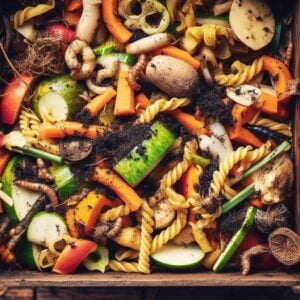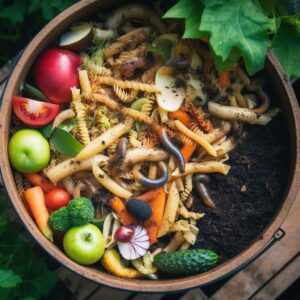Download: Can You Compost Pasta? Your Ultimate Guide to Eco-Friendly Disposal
Table of Contents
From leftover linguine to surplus spaghetti, our kitchens often see more pasta than we can consume. But here’s a fun fact for you: that starchy pasta can bypass the trash and head straight to the compost pile! Let’s dig into the al dente details of turning pasta into compost.
Tip: Learn more about how to compost
The Basics of Composting: A Perfect Fit for Pasta
Composting is like a backstage pass to the cycle of life, turning what we don’t eat into a treasure trove for our gardens. Pasta, whether it’s twirled, forked, or spooned, is part of a family of starchy foods that are prime candidates for composting.
Why? Because pasta is rich in carbohydrates, which break down into sugars that are a feast for compost microorganisms.
Related: Can You Compost Cheese?: Here Is What You Need To Know

The Environmental Impact of Composting Pasta
Imagine reducing landfill waste, curbing methane emissions, and creating a nutrient-dense soil supplement—all by composting your pasta. By adding pasta to your compost bin, you’re doing exactly that. It’s a small act with a big impact, helping to create a closed-loop system that nurtures your garden and the planet.
Cooked vs. Uncooked Pasta: A Composting Showdown
Cooked Pasta: The Saucy Subject
Cooked pasta decomposes faster due to its softer nature. However, it often comes with additives like oils, salts, and sauces that can attract pests. The trick is to ensure that cooked pasta is clean, with minimal sauce residue, and is added in small amounts to prevent any imbalances in your compost pile’s ecosystem.
Uncooked Pasta: The Crunchy Contender
Uncooked pasta may take longer to break down due to its hard texture but poses fewer risks of attracting pests. It also helps to add structure to your compost, promoting aeration. Break it into smaller pieces to speed up the decomposition process and prevent it from clumping together.
Tip: Learn more about compostable materials in composting
A Detailed Guide to Composting Pasta

Setting Up for Success
Choosing the right spot for your compost bin is crucial. It needs to be accessible, with good drainage and partial sunlight. Air circulation is essential, so if your bin doesn’t have holes, make some.
This facilitates aerobic decomposition, which is faster and less smelly. You can learn how to make holes and a local compost bin at home in this guide.
The Layering Technique
Layering is the secret to successful composting. Start with a base of browns—carbon-rich materials like dried leaves, straw, or shredded paper. Add your pasta, then a layer of greens—nitrogen-rich materials like vegetable scraps or grass clippings.
This ‘lasagna-style’ layering keeps your compost balanced and healthy.
Troubleshooting Pasta Composting Challenges
The main concerns with composting pasta are pests and odors. To avoid these, keep your compost well-mixed and ensure that pasta is buried under other compost materials.
If you’re adding cooked pasta, especially with sauces or oils, do it sparingly and ensure it’s well-integrated with browns to offset any potential issues.
Related: Can Meat Be Composted?: Here Is What You Need To Know
Expert Answers to Your Pasta Composting Questions
Can I compost pasta with sauce?
Lightly-sauced pasta can be composted, but heavy sauces should be avoided. If your pasta is drenched in sauce, give it a quick rinse or just add it in smaller quantities to keep your compost happy.
Can you compost rice and pasta?
Yes, you can compost rice and pasta — but with some considerations.
- Cooked rice and pasta: These can attract pests because they are moist and can ferment or mold. To compost cooked rice and pasta, it’s recommended to bury them deep within your compost pile to avoid pests and to mix them with brown compost materials that will absorb excess moisture and help balance the compost.
- Uncooked rice and pasta: These are less likely to attract pests compared to their cooked counterparts because they are dry. However, they should still be broken into smaller pieces to help them decompose faster. Uncooked rice can take a long time to break down, so crushing it can be beneficial.
For both cooked and uncooked rice and pasta, it’s important not to overload the compost with these materials, as they can clump and create an imbalance in the compost pile’s moisture levels.

Can you compost old pasta?
While old pasta can generally be composted, if it shows signs of mold or bacterial growth, it’s best to avoid adding it to your compost pile. Here’s why:
- Pathogenic organisms: Moldy or spoiled pasta can contain harmful bacteria and fungi. While a well-maintained compost pile can generate enough heat to kill many pathogens, home compost systems may not always reach the high temperatures needed to safely break down these harmful organisms.
- Risk to plants: If pathogenic bacteria or fungi survive the composting process, they can potentially be spread to plants when the compost is used as a soil amendment, which might cause diseases.
How Long Will Pasta Take to Compost?
Pasta, particularly when broken down into smaller pieces, can compost quickly—typically within 2-4 months. However, the timeline can vary based on composting conditions and the balance of materials in your bin.
Going Beyond Pasta: Enriching Your Compost Mix
While pasta is a great addition to your compost, diversity is key. Incorporating a variety of organic materials creates a richer, more balanced compost. Think of your compost like a gourmet meal for your garden—the more varied the ingredients, the better the end result.
Conclusion: Can You Compost Pasta?
Composting pasta is a definite “yes.” It’s a simple yet impactful way to contribute to a more sustainable world. By following these guidelines, you’ll ensure your leftover pasta doesn’t go to waste—literally. So, the next time you find yourself with an excess of elbow macaroni, remember, your compost pile offers the perfect solution.
I hope that you will find this article helpful. Let me know if you have questions in the comments section below.
Read also: Composting Limes (Fruits) And Lime ( CaCO3): The Detailed Guide
Can You Compost Hair?: Here Is What You Need To Know

